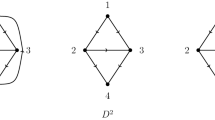Abstract
We consider cooperative games which are modified by subordination to communication networks. Two players i and j will be able to cooperate only if they pay for the cost w ij of their communication link (i,j). Coalitions of players are treated similarly and a new characteristic function form game is developed thus. We also examine incentive for players to cooperate in such situations as well as a related index of a player's communicative strength.
Similar content being viewed by others
References
Bird, C. G.: 1976, ‘On Cost Allocation for a Spanning Tree: A Game Theory Approach’, Networks 6, 335–350.
Claus, A., and Kleitman, D. J.: 1973, ‘Cost Allocation for a Spanning Tree’, Networks 3, 289–304.
Dubey, P. and Shapley, L. S.: 1984, ‘Totally Balanced Games Arising from Controlled Programming Problems’, Mathematical Programming 29, 245–267.
Granot, D. and Granot, F.: 1986, ‘A Fixed-Cost Spanning-Forest Problem’, working paper no. 1235, Faculty of Commerce and Business Administration, University of British Columbia.
Granot, D. and Huberman, G.: 1981, ‘Minimum Cost Spanning Tree Games’, Mathematical Programming 21, 1–18.
Granot, D. and Huberman, G.: 1982, ‘The Relationship Between Convex Games and Minimum Cost Spanning Tree Games: A Case for Permutationally Convex Games’, SIAM J. Alg. Meth. 3, 288–292.
Grofman, B. and Owen, G.: 1982, ‘A Game-Theoretic Approach to Measuring Degree of Centrality in Social Networks’, Social Networks 4, 213–224.
Kalai, E. and Zemel, E.: 1982, ‘Totally Balanced Games and Games of Flow’, Math. Oper. Res. 7, 476–478.
Kalai, E. and Zemel, E.: 1982, ‘Generalized Network Problems Yielding Totally Balanced Games’, Operations Research 30, 998–1008.
Megiddo, N.: 1978, ‘Computational Complexity and the Game Theory Approach to Cost Allocation for a Tree’, Math. Oper. Res. 3, 189–196.
Meyerson, R. B.: 1977, ‘Graphs and Cooperation in Games’, Math. Oper. Res. 2, 225–229.
Owen, G.: 1975, ‘On the Core of Linear Production Games’, Mathematical Programming 9, 358–370.
Owen, G.: 1982, Game Theory. Second Edition. Academic Press, New York.
Owen, G.: 1986, ‘Values of Graph-Restricted Games’, SIAM J. Alg. Disc. Meth. 7, 210–220.
Papadimitriou, C., and Steiglitz, K.: 1982, Combinatorial Optimization: Algorithms and Complexity. Prentice-Hall, Englewood Cliffs, NJ.
Rosenthal, E. C.: 1985, ‘Cooperative Games Arising from Mathematical Programming Problems’, unpublished Ph.D. thesis, Department of Industrial Engineering and Management Sciences, Northwestern University.
Rosenthal, E. C.: 1987, ‘The Minimum Cost Spanning Forest Game’, Economics Letters 23, 355–357.
Rosenthal, E. C.: 1988, ‘Communication Networks and Their Role in Cooperative Games’, to appear in Social Networks.
Shapley, L. S.: 1971, ‘Cores of Convex Games’, Int. J. Game Theory 1, 11–26.
Shapley, L. S. and Shubik, M.: 1972, ‘The Assignment Game: I. The Core’, 'Int. J. Game Theory 2, 111–130.
Topkis, D. M.: 1983, ‘Activity Selection Games and the Minimum Cut Problem’, Networks 13, 93–105.
Author information
Authors and Affiliations
Rights and permissions
About this article
Cite this article
Rosenthal, E.C. Communication and its cost in graph-restricted games. Theor Decis 25, 275–286 (1988). https://doi.org/10.1007/BF00133166
Issue Date:
DOI: https://doi.org/10.1007/BF00133166




